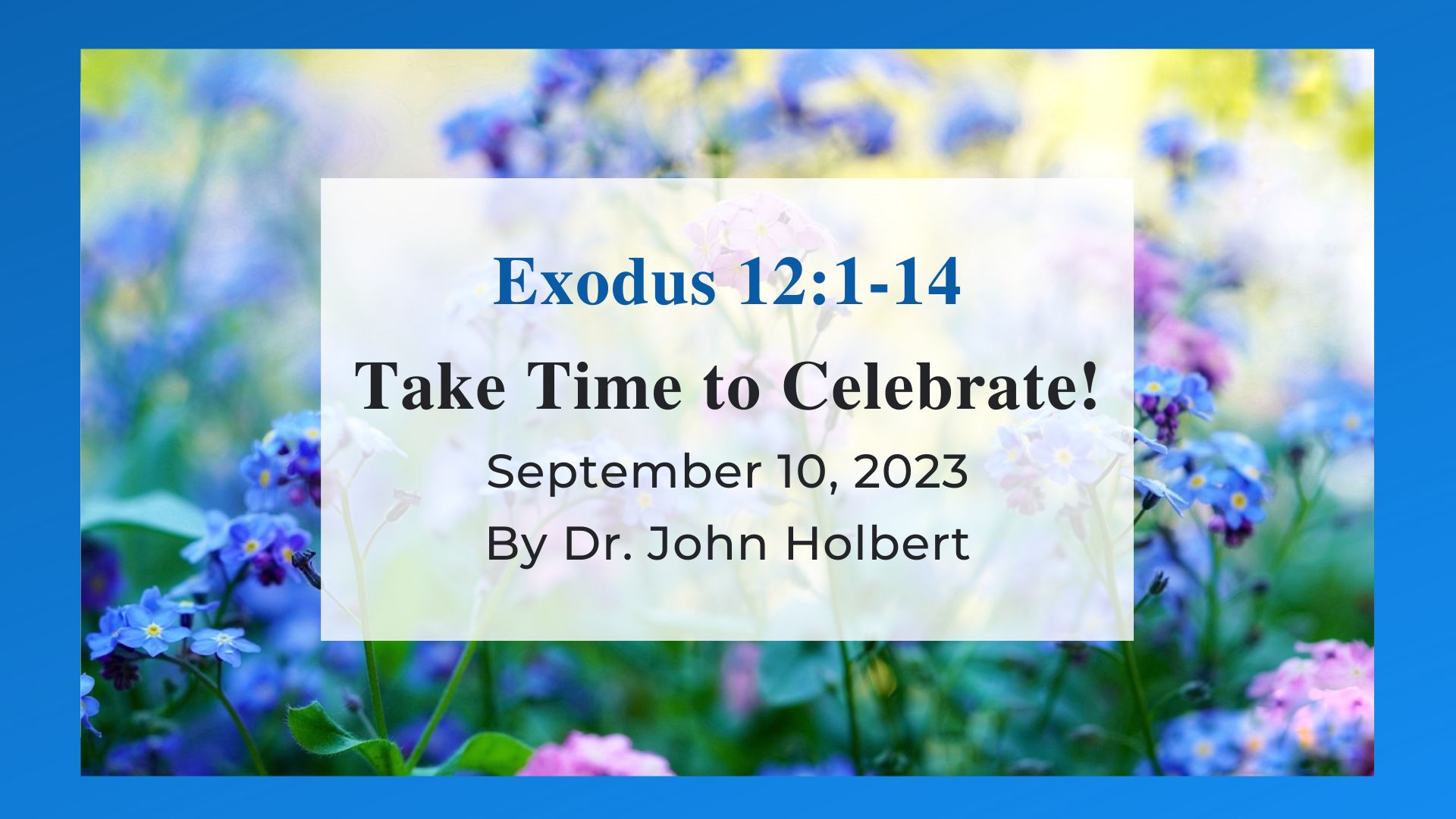Take Time to Celebrate! - Reflections on Exodus 12:1-14
by Dr. John Holbert on Monday, September 4, 2023

Take Time to Celebrate!
Exodus 12:1-14
The Peripatetic Hebrew Bible Preacher
No one would write a book like this today! Ex.1-11 is a fast-paced, electric narrative, leading from its broiling beginnings among the slaves of Egypt to the strange call of a reluctant Moses, to the increasingly horrifying plagues meted out against the Egyptian pharaoh and his people by a YHWH intent on “gaining glory” at their expense, and thereby proving to them and to the world that YHWH is the only God in the universe. It is a thrilling tale, made famous by recounting at Passover meals year by year, and by films, however poorly presented, both silent and audible. And then we read Ex.12!
Suddenly, we find ourselves immersed in the world of ritual, a place of precise dates correct foods, and cultic practice. No modern editor would allow such an intrusion to occur, stopping the onrushing story, slowing the narrative pace to a crawl, losing readers by the score. Then why is it here? Why should we now read about a Passover ritual that certainly was not instituted in the wilderness, but surely was created by a people with the leisure to celebrate their foundational story? But, of course, that is precisely the point. If we do not take time to celebrate the important stories, the possibility exists that the stories themselves will be either lost or corrupted or both. Ex.12:14 makes the point exactly: “This day shall be a day of remembrance for you.”
Enlaced with the ritual is found the tale of the 10th and most terrible plague, directed against Egypt, the horrible death of all Egyptian firstborns. And the blood of the slain lambs, prepared and eaten at the festival, is spread on the doorposts of the Israelites to ensure that the monstrous “Destroyer,” sent by YHWH, will “pass over” every Israelite house. But it is not enough merely to tell the story; it must regularly be enacted in the careful ritual of lamb or goat, properly roasted over the fire, and consumed with unleavened bread and bitter herbs (Ex.12:8). And it must be eaten with “loins girded, sandals on the feet, staff in hand,” and consumed “hurriedly” (Ex.12:11). Obviously, seder meals now are hardly done in such a fashion, presenting the right candles, and prepared haroseth, with many questions and much laughter. Still, the elements of the first celebration, as described in Ex.12, remain in place, however more comfortable the place of celebration may now thankfully be.
But is it in fact so strange to combine story and ritual so closely together? Hardly! Think of the Christian celebration of the Eucharist, offered weekly in many traditions, monthly in others (including often in my own United Methodist tradition). Here the ritual enshrines the story, and the story informs the ritual. I understand that studies show that attendance at church drops on communion Sundays, the first Sunday of the month in many churches. This may imply that some Christians have tired of the ritual, less enamored with the continuity of story and practice. Yet, without this repetition, the story may be lost or confused, as has happened in more than a few churches and denominations.
Is this need for story and ritual not enacted in secular society as well? As much as I may find it problematic, in every baseball park in the land, the “National Anthem” is played and sung (rather less sung these days!) before every game, and the song, “God Bless America” sung at the 7th inning stretch. The latter practice began after the attacks on New York and Washington on Sept.11, 2001. I am troubled by the latter 7th inning song, mainly because the song sung implies that God has a kind of special affinity for the USA, a claim I find false and dangerous. Still, I am a huge fan of baseball (I root for the Texas Rangers, and have for over five decades), and I refuse to allow these rituals to impede my love for the game. This a clear example of story and ritual joined together for the memory of the story, however problematic I find this particular memory.
And of course, July 4 is the quintessential US ritual, enshrining memory among the fireworks and hot dogs and beer. At the same time, our celebrations of July 4 have recently been deeply affected by the influence of the Black Lives Matter movement on the one hand, and the White Nationalist movement on the other. The former calls into question whether the July 4 celebrations take with any seriousness the exclusion of African-Americans in the nation’s history from the very beginning, exclusions that have fouled and corrupted the American story even in the 21st century. And among the latter, the very fact of an African-American demand to find a place in contemporary America has urged the White Nationalists to find ways to exclude them from modern America, claiming that America was first and always a place where white people had pride of place. This is an example where the story and the celebration of it are clouded with complex and competing ways to understand the basic story being celebrated.
Exodus 12 presents an early biblical example of what all cultures experience, namely the necessary celebration of a central story. Humanity has long and continuously done exactly that in order to keep its important narratives front and center as ways to ensure a common glue exists to hold society together. Ironically, at times, that attempt to celebrate the story provides not glue but forces that divide a culture rather than unify it. We would do well continually to look back at the old story itself and find in it common elements that might provide for us a way to overcome the divisions among us that ever threaten to pull us apart.
